Dr Quek Jin Jong
Dr. Quek Jin Jong, affectionately known as JJ, started his career as a school teacher. He taught in Singapore schools at the primary, secondary and junior college levels for 18 years before becoming a teacher educator at the College of Physical Education (CPE) in 1985. He was the first Dean of School of Physical Education (SPE) from 1991 to 2000, and has served as Principal Officer, Director’s Office, NIE since 2000. Dr. Quek has made many significant contributions to NIE and PESS, and positively influenced many teachers as well as leaders in education.
In this feature, Dr Quek shares his thoughts about PE and teacher training in the current landscape.

1985 Inter Poly & Varsity Staff Race: 4 x 100m Champions!
From left: Philip Lee, C Kunanlan, Quek Jin Jong, Paul Robinson
Expectation of PE in Singapore
Compared to other education systems, PE in Singapore is crucial in the delivery of holistic education in our curriculum.. As a ministry, we are using PE as a platform for students to achieve many skills. Besides the sports and games skills, students are also expected to develop life skills such as collaboration and leadership through PE.
PE is experiential and a very natural platform to develop students’ softer skills. Teachers need to recognise that soft skills can be intentionally facilitated during PE lesson. This consciousness should begin at lesson planning stage, and positive reinforcement must be in place to acknowledge such situations.
Given the limited hours of PE per week, teachers must optimise PE lessons to teach PE effectively. Furthermore, school leaders (SLs) must protect PE hours to support the effective implementation of the PE Syllabus 2014.
PE as part of total curriculum
When we see education from a broader perspective, we see PE contributing to the holistic development of the child – psycho-motor, social-emotional as well as cognitive. The ability to move efficiently builds self-confidence, enables group work and stimulates thinking. Research has demonstrated that physical activity contributes to important brain development in young children. Hence, PE is a crucial part of total curriculum in school and we need to engage other teachers to see PE as also achieving that professional goal.
Learning outcomes are articulated clearly in the 2014 syllabus. It is now up to the School Leaders and PE teachers to follow through in implementation. In order to implement the 2014 syllabus effectively, teaching Fundamental Motor Skills (FMS) well must be the focus in primary school. Developing FMS is like building the child’s foundation in PE. If students do not develop FMS well, then they will not have a solid foundation for building of skills later on. When FMS are learned well, students can then perform games skills and execute tactical concepts in games-like situations.
PE teacher training – a continuous journey
In the early years, one of the objectives of PE was to build resilience amongst the young people. Hence, pre-service training included many sports skills and emphasised outdoor education (OE). There were many weekend camps and outdoor activities. There was a very strong outdoor culture then and many trained teachers would return to CPE to help organise the Leadership Training Camps (LTC) for their juniors in the late 1980s.
With changing landscapes and structures over the years, the current provision of OE in pre-service is limited to a 5-day OBS experience. Ideally, OE in pre-service should extend beyond the OBS experience supplemented with weekend trips or camps during school breaks. However, there is a real need to prioritise what goes into teacher training. Compared to the 80s and 90s, current PE trainee teachers have a much narrow range of games skills as they specialised too early in their secondary schools, compared to the earlier batches. However, we also see a higher level of game skills performance in some of them.
Professional development of a PE teacher is an on-going process. PESS provides the foundation to prepare a PE teacher for school. Together with PESS, PESTA and PESEB provide continuous training to help the PE teacher stay abreast of current, best practice.
Getting children active in sports
The focus of PE should always be on the children and how they must have a wholesome programme. Not so much for competition but rather participation. We ensure that there is a broad base PE programme and a supporting structure that facilitates students’ participation in sports and games.
While there is a national agenda to achieve sports excellence, PE should focus on getting the majority to participate actively in sports and to enjoy physical activity in whatever form.
Advice for PE teachers
Always be true to your calling. Do what you should do as a PE teacher. No cutting of corners. Never let others take away your PE periods. Reason with others and explain the benefits of PE for the students. We know that what we do in PE and CCAs will impact the students not only in school but also later on in life. Spend time with the weaker students and they will be better through physical activity and sports.
Recollection by former students
“I was a student of Dr Quek in CPE from 1985 to 1986.
I remember him very clearly. On Day 1, he strode into class and flashed his transparencies. His transparencies were written clearly (in block letters so that it was easy to read!). Listed were the dates of assignments, assignment questions etc. From this, I know that he takes his work seriously and is well-prepared for his lectures and had thought through the entire module!
A highly efficient teacher, he taught clearly and well. He was energetic and lively in class, friendly and approachable outside class. As such, I still remember that he taught me the module of Maturation, Growth and Development. To this day, when I teach, I try to emulate his preparedness and clarity in communication.
Dr Quek was one lecturer who had influenced me greatly in the way I teach today.”
Ms Linda Khoo
PE Teacher, Singapore Chinese Girls’ Primary School

Dr Quek (far right) and the 1981 A Division cross country team champions
“Dr Quek was my cross country team coach in Hwa Chong Junior College. He coached me as a runner and helped me develop a love for running. He was a role model and a great motivator. He provided lots of variety in our training. We trained for speed on the track, endurance on the trails, and strength on the hills. Not to mention circuit training! Trainings were well planned, progressive and closely monitored. We competed in many competitions all over the island, and we were the A Division cross country team champions in 1981!”
Mr Karamjeet Singh
HOD (NT), Juying Secondary School
“Dr Quek was my PE Teacher when I was with Hwa Chong JC and later when I was with NIE. PE may not be my favourite subject but Dr Quek made it a point to explain why certain activities were done and how we need to do the training well in order to minimise injury. Being a Science student, I appreciated the explanation as it provided meaning to what we were doing”.
Mrs Chua Yen Ching
Executive Director, Academy of Singapore Teachers
“I remembered him as a wonderful and approachable teacher but I was never his best PE student in class! There were so many other sportsmen and sportswomen that he coached and worked with closely in college. However, despite that he has always got a kind word for his not-so-outstanding pupils for PE (and of course that included me!). When it came to college cross-country, I would be the first to volunteer as an official – for obvious reason of not having to run. However, because he was never judgemental, I ended up training and running in the cross-country, taking part in relays and sprints and other sporting events and occasionally winning prizes”.
Mrs Shirleen Ong
Director, Educational Technology

